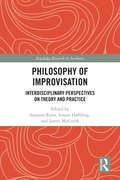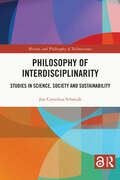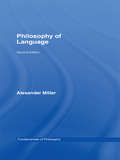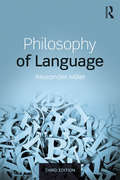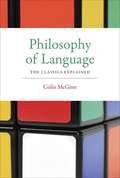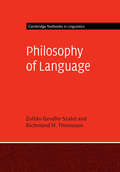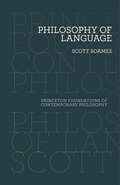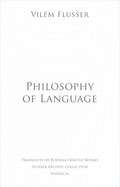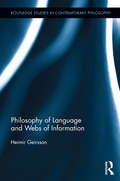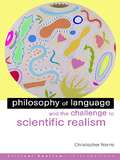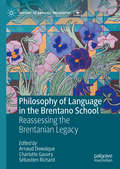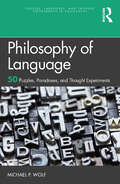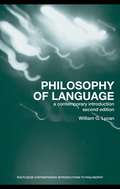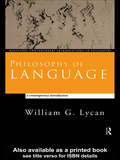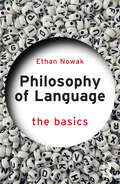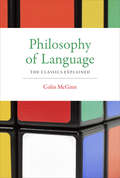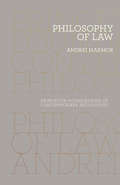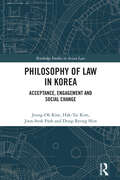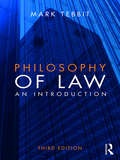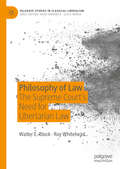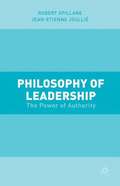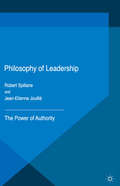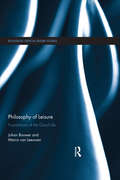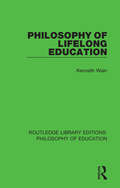- Table View
- List View
Philosophy of Improvisation: Interdisciplinary Perspectives on Theory and Practice (Routledge Research in Aesthetics)
by Susanne Ravn; Simon Høffding; James McGuirkThis volume brings together philosophical and interdisciplinary perspectives on improvisation. The contributions connect the theoretical dimensions of improvisation with different viewpoints on its practice in the arts and the classroom. The chapters address the phenomenon of improvisation in two related ways. On the one hand, they attend to the lived practices of improvisation both within and without the arts in order to explain the phenomenon. They also extend the scope of improvisational practices to include the role of improvisation in habit and in planned action, at both individual and collective levels. Drawing on recent work done in the philosophy of mind, they address questions such as whether improvisation is a single unified phenomenon or whether it entails different senses that can be discerned theoretically and practically. Finally, they ask after the special kind of improvisational expertise which characterizes musicians, dancers, and other practitioners, an expertise marked by the artist’s ability to participate competently in complex situations while deliberately relinquishing control. Philosophy of Improvisation will appeal to anyone with a strong interest in improvisation, to researchers working in philosophy, aesthetics, and pedagogy as well as practitioners involved in different kinds of music, dance, and theater performances.
Philosophy of Improvisation: Interdisciplinary Perspectives on Theory and Practice (Routledge Research in Aesthetics)
by Susanne Ravn; Simon Høffding; James McGuirkThis volume brings together philosophical and interdisciplinary perspectives on improvisation. The contributions connect the theoretical dimensions of improvisation with different viewpoints on its practice in the arts and the classroom. The chapters address the phenomenon of improvisation in two related ways. On the one hand, they attend to the lived practices of improvisation both within and without the arts in order to explain the phenomenon. They also extend the scope of improvisational practices to include the role of improvisation in habit and in planned action, at both individual and collective levels. Drawing on recent work done in the philosophy of mind, they address questions such as whether improvisation is a single unified phenomenon or whether it entails different senses that can be discerned theoretically and practically. Finally, they ask after the special kind of improvisational expertise which characterizes musicians, dancers, and other practitioners, an expertise marked by the artist’s ability to participate competently in complex situations while deliberately relinquishing control. Philosophy of Improvisation will appeal to anyone with a strong interest in improvisation, to researchers working in philosophy, aesthetics, and pedagogy as well as practitioners involved in different kinds of music, dance, and theater performances.
Philosophy of Interdisciplinarity: Studies in Science, Society and Sustainability (History and Philosophy of Technoscience)
by Jan Cornelius SchmidtInterdisciplinarity is a hallmark of contemporary knowledge production. This book introduces a Philosophy of Interdisciplinarity at the intersection of science, society and sustainability. In light of the ambivalence of the technosciences and the challenge of sustainable development in the Anthropocene, this engaged philosophy provides a novel critical perspective on interdisciplinarity in science policy and research practice. It draws upon the original spirit of interdisciplinarity as an environmentalist concept and advocates an essential change in human-nature relations. The author utilizes the rich tradition of philosophy for case study analysis and develops a framework to disentangle the various forms of inter- and transdisciplinarity. Philosophy of Interdisciplinarity offers a foundation for a critical-reflexive program of interdisciplinarity conducive to a sustainable future for our knowledge society and contributes to fields such as sustainability sciences, social ecology, environmental ethics, technology assessment, complex systems, philosophy of nature, and philosophy of science. It injects a fresh way of thinking on interdisciplinarity – and supports researchers as well as science policy makers, university managers, and academic administrators in critical-reflexive knowledge production for sustainable development.
Philosophy of Language
by Alex MillerThis engaging and accessible introduction to the philosophy of language provides an important guide to one of the liveliest and most challenging areas of study in philosophy. Interweaving the historical development of the subject with a thematic overview of the different approaches to meaning, the book provides students with the tools necessary to understand contemporary analytical philosophy. The second edition includes new material on: Chomsky, Wittgenstein and Davidson as well as new chapters on the causal theory of reference, possible worlds semantics and semantic externalism.
Philosophy of Language
by Alexander MillerPhilosophy of Language provides a comprehensive, meticulous survey of twentieth-century and contemporary philosophical theories of meaning. Interweaving the historical development of the subject with a thematic overview of the different approaches to meaning, the book provides students with the tools necessary to understand contemporary analytic philosophy. Beginning with a systematic look at Frege’s foundational theories on sense and reference, Alexander Miller goes on to offer a clear exposition of the development of subsequent arguments in the philosophy of language. Communicating a sense of active philosophical debate, the author confronts the views of the early theorists, taking in Frege, Russell, and logical positivism and going on to discuss the scepticism of Quine, Kripke, and Wittgenstein. The work of philosophers such as Davidson, Dummett, Searle, Fodor, McGinn, Wright, Grice, and Tarski is also examined in depth.The third edition has been fully revised for enhanced clarity and includes:· a short introduction for students, outlining the importance of the philosophy of language and the aims of the book;· two substantial new sections on Philip Pettit’s "ethocentric" account of rule-following and on Hannah Ginsborg’s "partial reductionism" about rule-following and meaning;· the addition of chapter summaries and study questions throughout, designed to promote greater understanding and engagement;· updated guides to further reading at the end of every chapter.This well-established and sophisticated introduction to the philosophy of language is an unrivalled guide to one of the liveliest and most challenging areas of philosophy and is suitable for use on undergraduate degrees and in postgraduate study.
Philosophy of Language
by Colin McginnMany beginning students in philosophy of language find themselves grappling with dense and difficult texts not easily understood by someone new to the field. This book offers an introduction to philosophy of language by explaining ten classic, often anthologized, texts. Accessible and thorough, written with a unique combination of informality and careful formulation, the book addresses sense and reference, proper names, definite descriptions, indexicals, the definition of truth, truth and meaning, and the nature of speaker meaning, as addressed by Frege, Kripke, Russell, Donnellan, Kaplan, Evans, Putnam, Tarski, Davidson, and Grice. The explanations aim to be as simple as possible without sacrificing accuracy; critical assessments are included with the exposition in order to stimulate further thought and discussion. Philosophy of Language will be an essential resource for undergraduates in a typical philosophy of language course or for graduate students with no background in the field. It can be used in conjunction with an anthology of classic texts, sparing the instructor much arduous exegesis. ContentsFrege on Sense and ReferenceKripke on NamesRussell on Definite DescriptionsDonnellan's DistinctionKaplan on DemonstrativesEvans on Understanding DemonstrativesPutnam on Semantic ExternalismTarski's Theory of TruthDavidson's Semantics for Natural LanguageGrice's Theory of Speaker Meaning
Philosophy of Language (Cambridge Textbooks in Linguistics)
by Zoltán Gendler Szabó Richmond H. ThomasonThis unique textbook introduces linguists to key issues in the philosophy of language. Accessible to students who have taken only a single course in linguistics, yet sophisticated enough to be used at the graduate level, the book provides an overview of the central issues in philosophy of language, a key topic in educating the next generation of researchers in semantics and pragmatics. Thoroughly grounded in contemporary linguistic theory, the book focus on the core foundational and philosophical issues in semantics and pragmatics, richly illustrated with historical case studies to show how linguistic questions are related to philosophical problems in areas such as metaphysics, epistemology, and ethics. Students are introduced in Part I to the issues at the core of semantics, including compositionality, reference and intentionality. Part II looks at pragmatics: context, conversational update, implicature and speech acts; whilst Part III discusses foundational questions about meaning. The book will encourage future collaboration and development between philosophy of language and linguistics.
Philosophy of Language (Princeton Foundations of Contemporary Philosophy #2)
by Scott SoamesA masterful overview of the philosophy of language from one of its most important thinkersIn this book one of the world's foremost philosophers of language presents his unifying vision of the field—its principal achievements, its most pressing current questions, and its most promising future directions. In addition to explaining the progress philosophers have made toward creating a theoretical framework for the study of language, Scott Soames investigates foundational concepts—such as truth, reference, and meaning—that are central to the philosophy of language and important to philosophy as a whole. The first part of the book describes how philosophers from Frege, Russell, Tarski, and Carnap to Kripke, Kaplan, and Montague developed precise techniques for understanding the languages of logic and mathematics, and how these techniques have been refined and extended to the study of natural human languages. The book then builds on this account, exploring new thinking about propositions, possibility, and the relationship between meaning, assertion, and other aspects of language use.An invaluable overview of the philosophy of language by one of its most important practitioners, this book will be essential reading for all serious students of philosophy.
Philosophy of Language (Univocal)
by Vilém FlusserIn 1963 Vilém Flusser presented a series of lectures at the Brazilian Institute of Philosophy (IBF) in São Paulo concerning the philosophy of language. The resulting ten essays would eventually be published in 1965 in the annual magazine of the Brazilian Institute of Technology and Aeronautics (ITA), and published here for the first time in book form. Flusser prepared each lecture as a response to the dialogs that followed the preceding lecture, thereby expanding and explicating his philosophy of language in an intense dialogical process. Despite the fact that the other side of the dialogue was not recorded, it becomes clear to the reader that the resulting discussions and polemics generated by the lectures progressively and profoundly changed Flusser&’s intended trajectory for the course. This kind of philosophy in fieri was in part the result of a group effort between all of those present, and subsequently synthesized by Flusser in every essay. As a result of this experience, Flusser adopted this dialogic method as an integral part of his future work.
Philosophy of Language and Webs of Information (Routledge Studies in Contemporary Philosophy #45)
by Heimir GeirssonThe nature of propositions and the cognitive value of names have been the focal point of philosophy of language for the last few decades. The advocates of the causal reference theory have favored the view that the semantic contents of proper names are their referents. However, Frege’s puzzle about the different cognitive value of coreferential names has made this identification seem impossible. Geirsson provides a detailed overview of the debate to date, and then develops a novel account that explains our reluctance, even when we know about the relevant identity, to substitute coreferential names in both simple sentences and belief contexts while nevertheless accepting the view that the semantic content of names is their referents. The account focuses on subjects organizing information in webs; a name can then access and elicit information from a given web. Geirsson proceeds to extend the account of information to non-referring names, but they have long provided a serious challenge to the causal reference theorist.
Philosophy of Language and the Challenge to Scientific Realism (Routledge Studies in Critical Realism)
by Christopher NorrisIn this book Christopher Norris develops the case for scientific realism by tackling various adversary arguments from a range of anti-realist positions. Through a close critical reading he shows how they fail to make adequate sense on any rational, consistent, and scientifically-informed survey of the evidence. Along the way he incorporates a number of detailed case-studies from the history and philosophy of science. Norris devotes much of his discussion to some of the most prominent and widely influential source-texts of anti-realism. Also included are the sophisticated versions of verificationism developed - albeit in very different ways - by thinkers such as Michael Dummett and Bas van Fraassen. Central to Norris's argument is a prolonged engagement with the once highly influential but nowadays neglected work of Norwood Russell Hanson. This book will be welcomed especially by readers who possess some knowledge of the background debate and who wish to deepen and extend their understanding of these issues beyond an introductory level.
Philosophy of Language in the Brentano School: Reassessing the Brentanian Legacy (History of Analytic Philosophy)
by Arnaud Dewalque Charlotte Gauvry Sébastien RichardThis collection of fourteen original essays addresses the seminal contribution of Franz Brentano and his heirs, to philosophy of language. Despite the great interest provoked by the Brentanian tradition and its multiple connections with early analytic philosophy, precious little is known about the Brentanian contribution to philosophy of language. The aim of this new collection is to fill this gap by providing the reader with a more thorough understanding of the legacy of Brentano and his school, in their pursuit of a unique research programme according to which the analysis of meaning is inseparable from philosophical inquiries into what goes on in the mind and what there is in the world. In three parts, the volume first reconstructs Brentano’s pathbreaking thoughts on meaning and grammatical illusions, exploring their strong connections with the Austro-German tradition and analytic philosophy. It then addresses the multifaceted debates on the objectivity of meaning in the Brentano School and its aftermath (Meinong, Husserl, Ingarden, Twardowski and the Lvov-Warsaw School). Finally, part three explores Brentano’s wider legacy, namely: Husserl’s theory of modification and typicality, Bühler’s theory of linguistic and non-linguistic expressions, and Wittgenstein’s thoughts on guidance and rule-following. The result is a unique collection of essays which shows the significance, originality and timely character of the Brentanian philosophy of language.
Philosophy of Language: 50 Puzzles, Paradoxes, and Thought Experiments (Puzzles, Paradoxes, and Thought Experiments in Philosophy)
by Michael P. WolfThis book offers readers a collection of 50 short chapter entries on topics in the philosophy of language. Each entry addresses a paradox, a longstanding puzzle, or a major theme that has emerged in the field from the last 150 years, tracing overlap with issues in philosophy of mind, cognitive science, ethics, political philosophy, and literature. Each of the 50 entries is written as a piece that can stand on its own, though useful connections to other entries are mentioned throughout the text. Readers can open the book and start with almost any of the entries, following themes of greatest interest to them. Each entry includes recommendations for further reading on the topic. Philosophy of Language: 50 Puzzles, Paradoxes, and Thought Experiments is useful as a standalone textbook, or can be supplemented by additional readings that instructors choose. The accessible style makes it suitable for introductory level through intermediate undergraduate courses, as well as for independent learners, or even as a reference for more advanced students and researchers. Key Features: Uses a problem-centered approach to philosophy of language (rather than author- or theory-centered) making the text more inviting to first-time students of the subject. Offers stand-alone chapters, allowing students to quickly understand an issue and giving instructors flexibility in assigning readings to match the themes of the course. Provides up-to-date recommended readings at the end of each chapter, or about 500 sources in total, amounting to an extensive review of the literature on each topic.
Philosophy of Language: A Contemporary Introduction
by William G. Lycan William G LycanPhilosophy of Language: A Contemporary Introduction introduces the student to the main issues and theories in twentieth century philosophy of language, focusing specifically on linguistic phenomena. Topics are structured in four parts in the book. Part I, Reference and Referring Expressions, includes topics such as Russell's Theory of Desciptions, Donnellan's distinction, problems of anaphora, the description theory of proper names, Searle's cluster theory, and the causal-historical theory. Part II, Theories of Meaning, surveys the competing theories of linguistic meaning and compares their various advantages and liabilities. Part III, Pragmatics and Speech Acts, introduces the basic concepts of linguistic pragmatics, includes a detailed discussion of the problem of indirect force and surveys approaches to metaphor. Part IV, new to this edition, examines the four theories of metaphor. Features of Philosophy of Language include: new chapters on Frege and puzzles, inferentialism, illocutionary theories of meaning and relevance theory chapter overviews and summaries clear supportive examples study questions annotated further reading glossary.
Philosophy of Language: A Contemporary Introduction (Routledge Contemporary Introductions to Philosophy)
by William G. LycanPhilosophy of Language introduces the student to the main issues and theories in twentieth-century philosophy of language. Topics are structured in three parts in the book. Part I, Reference and Referring Expressions, includes topics such as Russell's Theory of Desciptions, Donnellan's distinction, problems of anaphora, the description theory of proper names, Searle's cluster theory, and the causal-historical theory. Part II, Theories of Meaning, surveys the competing theories of linguistic meaning and compares their various advantages and liabilities. Part III, Pragmatics and Speech Acts, introduces the basic concepts of linguistic pragmatics, includes a detailed discussion of the problem of indirect force and surveys approaches to metaphor.Unique features of the text:* chapter overviews and summaries* clear supportive examples* study questions* annotated further reading* glossary.
Philosophy of Language: The Basics (The Basics)
by Ethan NowakThis book provides beginners with a sense of the questions and methods that make up the philosophy of language. The first four chapters develop the idea that language is a system that allows us to exchange information with each other, and the second four chapters explore the idea that language is a tool we can use to perform actions, like promising, insulting, and socially positioning ourselves.The first part of the book traces an arc connecting questions like: What is language? Where does meaning come from? How do we use meanings to send messages to each other? The second part of the book takes up questions like: Does pornography silence women? What is offensive about slurs? What do we lose when languages go extinct? With a glossary of key terms, questions for reflection, and suggestions for further reading, Philosophy of Language: The Basics is the place to start for anyone who is curious about how high the seas of language rise.
Philosophy of Language: The Classics Explained (The\mit Press Ser.)
by Colin McGinnAn introduction to philosophy of language through systematic and accessible explanations of ten classic texts by such thinkers as Frege, Kripke, Russell, and Putnam.Many beginning students in philosophy of language find themselves grappling with dense and difficult texts not easily understood by someone new to the field. This book offers an introduction to philosophy of language by explaining ten classic, often anthologized, texts. Accessible and thorough, written with a unique combination of informality and careful formulation, the book addresses sense and reference, proper names, definite descriptions, indexicals, the definition of truth, truth and meaning, and the nature of speaker meaning, as addressed by Frege, Kripke, Russell, Donnellan, Kaplan, Evans, Putnam, Tarski, Davidson, and Grice. The explanations aim to be as simple as possible without sacrificing accuracy; critical assessments are included with the exposition in order to stimulate further thought and discussion.Philosophy of Language will be an essential resource for undergraduates in a typical philosophy of language course or for graduate students with no background in the field. It can be used in conjunction with an anthology of classic texts, sparing the instructor much arduous exegesis.ContentsFrege on Sense and Reference • Kripke on Names • Russell on Definite Descriptions • Donnellan's Distinction • Kaplan on Demonstratives • Evans on Understanding Demonstratives • Putnam on Semantic Externalism • Tarski's Theory of Truth • Davidson's Semantics for Natural Language • Grice's Theory of Speaker Meaning
Philosophy of Law (Princeton Foundations of Contemporary Philosophy #10)
by Andrei MarmorIn Philosophy of Law, Andrei Marmor provides a comprehensive analysis of contemporary debates about the fundamental nature of law—an issue that has been at the heart of legal philosophy for centuries. What the law is seems to be a matter of fact, but this fact has normative significance: it tells people what they ought to do. Marmor argues that the myriad questions raised by the factual and normative features of law actually depend on the possibility of reduction—whether the legal domain can be explained in terms of something else, more foundational in nature.In addition to exploring the major issues in contemporary legal thought, Philosophy of Law provides a critical analysis of the people and ideas that have dominated the field in past centuries. It will be essential reading for anyone curious about the nature of law.
Philosophy of Law in Korea: Acceptance, Engagement and Social Change (Routledge Studies in Asian Law)
by Jeong-Oh Kim Hak Tai Kim Joon-Seok Park Dong-Ryong ShinWhen Korea began as a newly independent state in 1948, its economy was very underdeveloped and the rule of law was just established. The journey of democratization in Korea was not without challenges. This book traces the history of the legal philosophy development in Korea and highlights Korea's unique experience. This book shows how Western legal philosophy has been accepted in Korea, a non-Western country that has newly introduced the Western legal system and what role the legal philosophy has played in social context. The book also examines academic scholars' intellectual activities in a historical context and how their intellectual products are yielded through their continuous response to the circumstances of the time. It specifically looks at the many challenging tasks legal philosophers had to overcome in a society when the rule of law and democracy had not yet settled. The book explores how Korean legal philosophers coped during such unique historical situations. It also illustrates how Korean scholars accepted legal philosophies of Germany and jurisprudence and integrated them to change social realities of Korea. Through Korea’s experience, this book will provide insights into how modern legal philosophy develops in a new state and what legal philosophers' responses would be like during such a process. The developing process of legal philosophy in Korean society will interest not only readers in countries who have had similar experiences to Korea, but also readers in the West.
Philosophy of Law: An Introduction
by Mark TebbitPhilosophy of Law: An Introduction provides an ideal starting point for students of philosophy and law. Setting it clearly against the historical background, Mark Tebbit quickly leads readers into the heart of the philosophical questions that dominate philosophy of law today. He provides an exceptionally wide-ranging overview of the contending theories that have sought to resolve these problems. He does so without assuming prior knowledge either of philosophy or law on the part of the reader. The book is structured in three parts around the key issues and themes in philosophy of law: What is the law? – the major legal theories addressing the question of what we mean by law, including natural law, legal positivism and legal realism. The reach of the law – the various legal theories on the nature and extent of the law’s authority, with regard to obligation and civil disobedience, rights, liberty and privacy. Criminal law – responsibility and mens rea, intention, recklessness and murder, legal defences, insanity and philosophies of punishment. This new third edition has been thoroughly updated to include assessments of important developments in philosophy and law in the early years of the twenty-first century. Revisions include a more detailed analysis of natural law, new chapters on common law and the development of positivism, a reassessment of the Austin–Hart dispute in the light of recent criticism of Hart, a new chapter on the natural law–positivist controversy over Nazi law and legality, and new chapters on criminal law, extending the analysis of the dispute over the viability of the defences of necessity and duress.
Philosophy of Law: The Supreme Court’s Need for Libertarian Law (Palgrave Studies in Classical Liberalism)
by Walter E. Block Roy WhiteheadLooking at discrimination, education, environment, health and crime, this volume analyses United States Supreme Court rulings on several legal issues and proposed libertarian solutions to each problem. Setting their own liberal theory of law, each chapter discusses the law at hand, what it should be, and what it would be if their political economic philosophy were the justification of the legal practice. Covering issues such as sexual harassment, religion, markets in human organs, drug prohibition and abortion, this book is a timely contribution to classical liberal debate on law and economics.
Philosophy of Leadership: The Power of Authority
by Jean-Etienne Joullié Robert SpillanePhilosophy of Leadership.
Philosophy of Leadership: The Power of Authority
by Jean-Etienne Joullié Robert SpillanePhilosophy of Leadership has been written to arouse curiosity, not to satisfy it. The authors point out ideas about leadership which draw upon both ancient and modern wisdom. This book develops a philosophy of leadership by tracing the evolution of Western ideas from philosophical perspectives, ancient and modern.
Philosophy of Leisure: Foundations of the good life (Routledge Critical Leisure Studies)
by Johan Bouwer Marco van LeeuwenWhat is leisure? How does leisure relate to leading a good life? This critical and intelligent study interrogates the basic principles of leisure and demonstrates the continuing relevance of these questions for our society today. It not only explores the traditional philosophical concepts at the heart of leisure studies, but also pursues new possibilities for reconceptualising leisure that have emerged from recent developments in society, technology and the broader discipline of philosophy itself. Approaching leisure from a philosophically inquisitive perspective, the book argues that leisure revolves around the pursuit of happiness, human flourishing and well-being, making it both a state of mind and a state of being. Its exploration of the meaning of leisure addresses key issues such as identity, ethics, spirituality, human experience, freedom, technology, embodiment, well-being, the fundamental properties of leisure and the challenge of offering a meaningful definition. Revitalising the subject of leisure studies with its originality, Philosophy of Leisure: Foundations of the Good Life is fascinating reading for all students and scholars of leisure studies, philosophy, sociology, psychology and ethics.
Philosophy of Lifelong Education (Routledge Library Editions: Philosophy of Education #19)
by Kenneth WainThis book, first published in 1987, provides a rigorous philosophical analysis of lifelong education. The author presents his arguments simply and directly so that the book is accessible to students who are new to philosophy and adult education.
